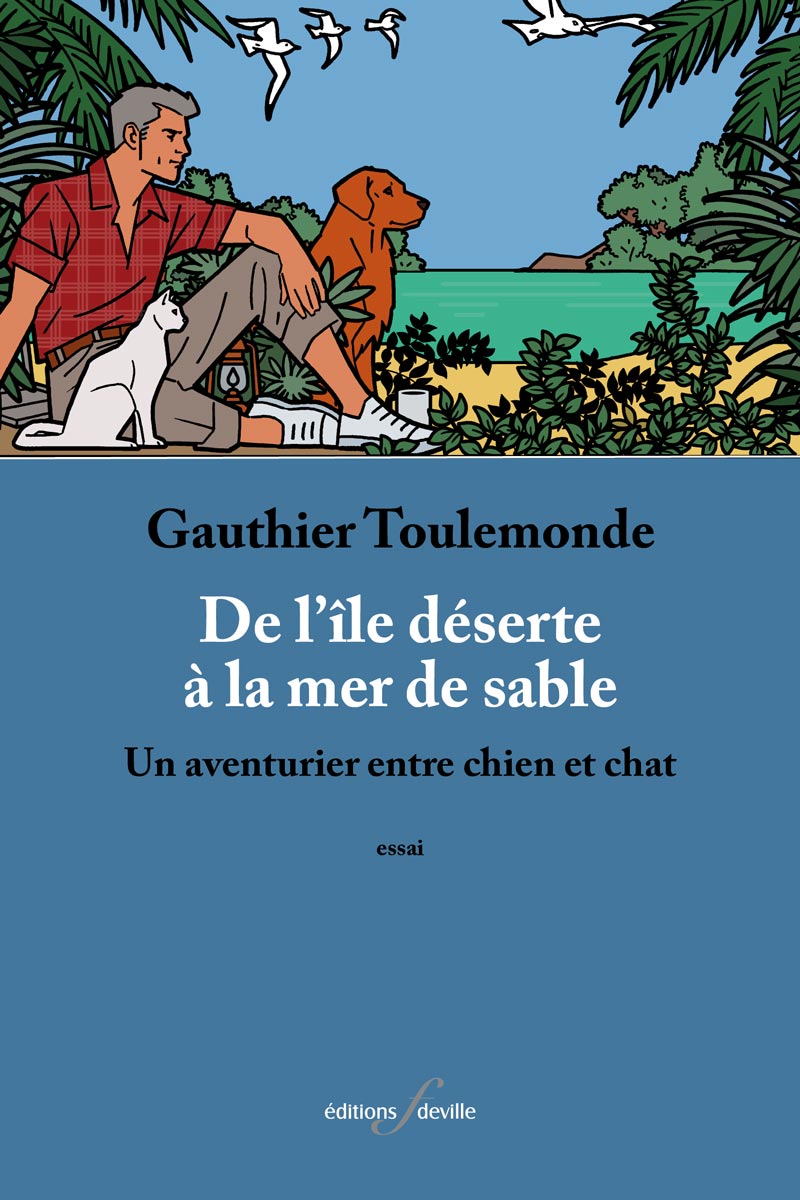Gauthier Toulemonde
De l’île déserte à la mer de sable.
Un aventurier entre chien et chat.
From desert island to sea of sand.
An adventurer between cat and dog.
To be published in November 2025, his next book offers a new reading of his expeditions: he combines his experiences with the analyses of a scientist, a philosopher and a psychologist, to question the limits of the body, the mind and our relationship with isolation, nature and surpassing ourselves.In 2026, he will embark on a new expedition - this time to a deserted Pacific island, again for 40 days of complete isolation. He will be joined only by a dog… and a mysterious presence that promises to redefine the limits of solitude and companionship.This bold journey will mark a world first, followed by a committee of Swiss scientists and a French CNRS researcher. The project is supported by F. Deville Publishing House, and is expected to attract major international media attention.The expedition will be supported daily by a social networking campaign.The expedition project is still top secret, but will be unveiled to the press in October 2025.
An extraordinary journey from Indonesia to Oman, a journey of self-discovery in the heart of the unforgiving deserts.
Widely publicized author.
From the pioneer of remote work.
Gauthier Toulemonde, a member of the Société des Explorateurs, has chosen to forge his own path away from the beaten track. His book takes us to an isolated island in Indonesia, where Gauthier settles with only his faithful dog and his mischievous cat. But this is only the beginning of his journey. The adventure reaches its climax when he defies the most unforgiving deserts of Oman, guided by a desire to live in harmony with nature.
The first night alone was a moment of revelation, when eternal silence envelops Gauthier, leaving him to contemplate the rhythm of the day, marked by a sun that becomes his only clock.
The walls of dunes rise with the dawn, creating a striking spectacle in absolute isolation.
This is not simply a tale of exploration, but a profound deep introspection on the need to take a break from everyday life, from the hustle and bustle of the world to get closer to nature.
Gauthier Toulemonde shares his moments of solitude, his wonder and the challenges he has overcome, inviting readers to reflect on their own quest for meaning and inner peace. He describes a fascinating journey where the search of the unknown becomes the path to self-discovery.
"De l’île déserte à la mer de sable" is an ode to exploration, to nature and to the eternal quest for our place in this vast world.
The press talk about it
Le Monde
Author of Chroniques insulaires (with Jean-Pierre Guéno, Timbropresse, 2014) and Robinson volontaire (Arthaud, 2015), the latest book by the member of the Society of French Explorers, De l'Ile déserte à la mer de sable (Editions F. Deville), allows Gauthier Toulemonde to take stock of his immobile travels, on his Indonesian island and in the Rub al-Khali, "on the burning borders of Yemen, Saudi Arabia, the United Arab Emirates and Oman. It covers an area the size of France, Belgium and Holland combined".
As a child, the author promised himself in the family home, talking to a white cat he didn't know, that one day he would go "to a desert island with a dog and you, if you're willing (...). Thus was born, at the age of five, under the cherry tree in my parents' garden, the oath of Patanga", named after an island he invented for himself in his "imaginary ocean [which] is none other than the grass that surrounds him". Fifty years on, he has done just that!
In De l'île déserte à la mer de sable, Gauthier Toulemonde begins with his participation in doctor and explorer Jean-Louis Etienne's expedition to Clipperton in 2004-2005, which he describes as an "initiatory" voyage in every respect.
He asks the scientists a lot of questions about their self-sufficient working lives. My childhood dream seems technically possible. For my project, I'll have to stay in touch with my company, because I can't imagine escaping my responsibilities for several weeks at a time". And so the project for a "robinsonnade 2.0" was born, with a strong emphasis on teleworking, with the help of solar energy. "Do you think I'll be able to do it?" he asks Jean-Louis Etienne, who replies: "Go after your dreams, you'll find the strength. And already the idea of solitude, "especially in a hostile environment”. That would probably be the main challenge". His discussions with Jean-Louis Etienne helped him to understand "that a lot of things happen in the mind". The explorer also told him about the dog Lynet, who accompanied him on the ice floes aboard the Polar Observer in 2002: "A dog and solar panels to live self-sufficiently on an ice floe for four months - that's what appealed to me". For Gao Xingjian, winner of the Nobel Prize for Literature in 2000, "solitude is even more of a necessary condition for freedom, and freedom depends above all on the ability to think freely; and it is precisely when he is alone that man can begin to think" (De la création, Seuil, 2013). That must speak volumes to our explorer.
Indonesia
So it was quite naturally that he came up with the idea that "thanks to new technologies and solar energy, we can work remotely from remote places on the planet (...)... and fulfil a childhood dream". All he had to do was find a desert island, a dog and a cat to accompany him for forty days. So it was that Gauthier set off for Indonesia, equipped with a computer and solar panels, duly accompanied, a hen and a rooster having joined the little troupe, a teleworking experiment reported in a series of articles published in 2013 on the Employment channel of the Lemonde.fr website.
The island appears, "wild, a little magnificent". His friend, Swiss adventurer Raphaël Domjan, who helped him set up, left him to his solitude. The tent, "for safety reasons, will not be visible from the sea". After Captain Haddock, it was Robinson Crusoe's turn to be invoked, followed by Bergson (Les Deux sources de la morale et de la religion): "Those whom circumstances condemn to solitude for a time, and who do not find in themselves the resources of a deep interior life, know what it costs to let themselves go, that is to say, not to set their individual self at the level prescribed by the social self". So, for dinner, he sets the table and gets dressed. Gecko, his dog, "becomes [his] constant confidant". One of the two cats has disappeared, perhaps devoured by a monitor...". The island suddenly looks like Jurassic Park" when giant bats fly overhead.
He works, facing the sea. The group he manages from a distance and the articles he has to write lead him to wonder "what difference there is between working in France or on this island from which I barely benefit (...). I feel like I'm missing out on something: probably the real life of an islander".
Gauthier Toulemonde has had a few scares, finding it extremely difficult to get back to the beach after being surprised by currents during a dive; when dangerous poachers land on his island; when confronted by a monitor lured by the promise of an easy meal; harassed by sand flies - "my back is covered in hundreds of bites" - or huge spiders "capable of jumping"...
The days passed. "If solitude seems preferable to society, perhaps I have gained in inner richness," asks the author, who refers to Petrarch (1304-1374) and his "solitaire", "l’homme heureux".
We need to think about leaving. "By dismantling this camp, I feel like I'm methodically destroying part of my life. Gauthier lost 14 kg. On his return to France, he learned that he had contracted several tropical diseases, which took him six months to get rid of. But if he held out, it was "thanks to [his] companions who, just like [him], have reclaimed a life in the great outdoors".
Oman
Three years later, Gauthier, who "aspired to live in the most isolated place possible", headed for Oman and the Rub Al-Khali.
His tent pitched in the middle of the dunes, with two computers and a satellite telephone powered by four solar panels, Gauthier's only company is Slooki, a Persian greyhound entrusted to him by the guide Ahmed who set him up - after an epic camel trek, it's already quite an adventure - before abandoning him to his fate for forty days.
He has one last piece of advice in mind from the film-maker Amer Khatib, who carefully chose his corner of the dune: "Everyone carries their world in their heart. Gauthier, if you're happy in your head, then your camp will be a happy camp. Have faith in yourself and everything will be fine.
Total self-sufficiency awaits him, living on his provisions - rice and dates are his staple diet - and cans of water. On the island, at least he had coconuts. Slooki helps him on his sometimes adventurous excursions: "Knowing nothing about the labyrinth around me, I rely on the dog to tell me which way to go". There are no borders here. Not without irony, he has named a huge dune opposite him Everest.
"To solitude is added the isolation of an eremitical life. Am I prepared for this? (...) Being busy is reassuring and takes my mind off things". Gauthier Toulemonde's main tasks are to share his experience, particularly with children, via the Adphile website, an association attached to La Poste, and with readers of Timbres magazine and the Lemonde.fr website, with whom he shares his experience as an extreme teleworker by writing a few articles. He can't escape his group's accounts and cash flow forecasts... He keeps Homer company - "Alas! In what land have I failed again? —Schopenhauer, Kipling, Montaigne, Hergé…
Gauthier's adventure is in its final days: "Leaving for unknown lands, taking a break, escaping from the harmful vibrations of our age, from the crowd, is an escape. An escape of sorts, but isn't it an art that can be practised with talent?
For his part, François Cheng explains (L’un vers l’autre. En voyage avec Victor Segalen, Albin Michel, 2008) that "every true journey is the transmutation of a journey that we have already made within ourselves, a self that seeks to transcend itself with a view to surpassing itself, to reconciling itself"... Or "a precious inner harmony", as Gauthier Toulemonde concludes.







